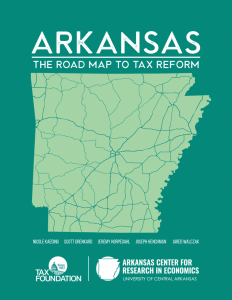The last comprehensive tax reform in Arkansas was in 1971. Before that, in 1929. With the creation of the Arkansas Tax Task Force, Arkansas is ready to challenge the status quo and pass tax reform. Prior to the creation of this task force, the Arkansas Center for Research in Economics partnered with the Tax Foundation to publish Arkansas: The Road Map to Tax Reform. Co-written by ACRE Scholar and Associate Professor Jeremy Horpedahl, this report looks at the state of taxation in Arkansas. This includes understanding Arkansas’s strengths, discussing the challenges Arkansas faces, and exploring possible solutions. This report makes several suggestions to improve the tax code, in areas such as the individual income tax, corporate income tax, sales tax, and property tax.
Arkansas’s individual income taxes for the top rate are the highest in the region. On top of this, a middle class tax cut was passed in 2015 that resulted in making the tax system more confusing. The suggestions in this report state that broadening the tax base, lowering rates, and making it easier to understand will make the system more neutral, fair, and understandable.
Arkansas’s corporate income tax is the second highest in the region at 6.5 percent, only behind Louisiana. The authors’ suggestions are similar to their suggestions for the individual income tax – lower the rates and consolidate the tax schedules. However, the report also has another key suggestion: eliminating tax credits, which evidence shows don’t provide much return to the state and create a system of government picking winners and losers.
Arkansas’s sales tax is one of the most important drivers of revenue at the state and local level. This report proposes simplifying the sales tax by broadening its base. There are currently many services that are unnecessarily exempt from Arkansas’s sales tax base. This is another example of where the government is picking winners and losers. Eliminating these exemptions solves this problem.
Arkansas’s property tax is relatively low, and is one of the least economically hurtful taxes, so this report only recommends small areas for reform and improvement.

